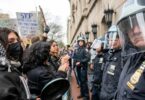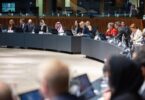Iqbal Khan
President Donald Trump once again caught India by its throat during Davos annual gala. He rubbed more salt into the bruised Indian ego when he welcomed Prime Minister Imran Khan for their meeting on January 21. Trump startled everybody when he mentioned the word Kashmir, to India’s chagrin, in his opening remarks. He said: “We’re going to be talking about trade and many other things. But trade is going to be of very, very paramount importance. And we’re doing more trade as it turns. And we’re working together on some borders, and we’re talking about Kashmir and the relation to what’s going on with Pakistan and India.
And if we can help, we certainly will be helping. And we’ve been watching that and following it very, very closely”. In a follow up, much to the chagrin of the rightist and self-righteous Indian leadership, the White House even put that clip of Trump’s opening remarks on the official website. Trump-Imran meeting was the third in less than a year amid reports that the US and Afghan Taliban are close to striking a peace deal after over yearlong painstaking peace process. Ahead of talks Trump had said trade and borders were both critical points for discussion, while the premier had said that for him Afghanistan was the top priority. PM also conveyed Islamabad’s concerns over increasing tensions in the Persian Gulf region and the impact any conflict could have on Pakistan.
Irrespective of whether Trump actually does something on Kashmir issue, one good thing has emerged out of the events since August 5 forcible annexation of Kashmir by India; both Trump and Modi have done a big service to Kashmiris; the former by publicly offering support in resolution and the latter by revoking Kashmir’s special status under Article 370 of the Indian constitution. Both have achieved in six months what Pakistan could not in seven decades. Thank you Mr Trump and NarendraModi, say Kashmiri Muslims, for taking the gloss off the “shining secular India” perception and exposing the narrow-ended Hinudtva mindset.
And interestingly, to balance it off, here in Islamabad Chief US diplomat for South Asian affairs, Alice Wells came down hard upon flagship project China Pakistan Economic Corridor (CPEC. Wells emphasised that there is no transparency in the projects and it will increase cash-strapped Pakistan’s debt burden. She also pointed out that companies blacklisted by the World Bank have got contracts under the CPEC. She urged Pakistan to rethink its involvement in it. Wells also questioned the immunity from prosecution for the newly formed CPEC Authority.
Wells stern criticism came just after Pakistan Foreign Minister Shah MahmoodQureshi sought closer engagement and a robust trade and investment relationship between Pakistan and the US during his recent visit to Washington. Qureshi had also sought help from the US to get the country off the Financial Action Task Force’s (FATF) grey list.
Foreign Minister Shah MehmoodQureshi said that Trump assured Imran that he would visit Pakistan soon. He termed the third meeting between the two leaders ‘good’ and added they discussed ways to strengthen the bilateral relationship; “important issues” were discussed with Trump and his “entire team”. The meeting also discussed the issue of Kashmir and the US president agreed that “there should be a solution” for the decades-long dispute.
During working level engagement, Alice Wells, met Foreign Secretary SohailMahmood on January 21, where the two sides discussed a range of bi-lateral issues. Wells emphasised that a strong trade and in-vestment relationship was key to advancing the shared vision of the leadership of both countries for a long term, broad-based and enduring partnership. Foreign secretary highlighted the grave human rights and humanitarian situation in IOK, intensified ceasefire violations from the Indian side, belligerent rhetoric of the Indian civil and military figures, and India’s aggressive measures along the Line of Control. He stressed the need for the international community to play its role in the peaceful resolution of the Jammu and Kashmir dispute. The two sides also discussed recent developments regarding the Afghan peace and reconciliation process.
Wells held talks with national leadership on several issues, including Pak-US ties, the Afghan reconciliation process, ongoing tensions in the region and Indian atrocities in occupied Kashmir. She followed up on the foreign minister’s discussions in Washington where he had met US Secretary of State Mike Pompeo, National Security Adviser Robert O’ Brien, and Under Secretary of Defence John Rood. The foreign minister recently concluded a three-day visit to the United States — the third leg of his mission to defuse tensions in the Middle East — after having already visited Tehran and Riyadh as part of Pakistan’s diplomatic efforts to ease tensions in the region.
And in IOK, Peoples Democratic Party (PDP) President Mehbooba Mufti termed the visit of Indian ministers to occupied Kashmir “curated photo” opportunity to show there is normalcy in the region, even though there is “internet shutdown” in the valley. “Normalcy acrobatics in full swing. Kashmir continues to reel under a crippling internet shutdown & political leaders remain detained. There is massive surveillance & heavy troop presence yet curated photo ops continue,” a tweet on Mehbooba Mufti’s Twitter handle reads. Mehbooba’s daughter Iltija Mufti has been operating her mother’s Twitter handle since August 5 when the PDP president was placed under detention in the wake of abrogation of Article 370 provisions.
One is not sure whether Trump really want to help resolve Kashmir issue or he is using it as a carrot until he signs peace deal with Taliban, what Wells said matters a lot, Indo-US nexus will continue to create hurdles in the way of timely completion of CPEC.






